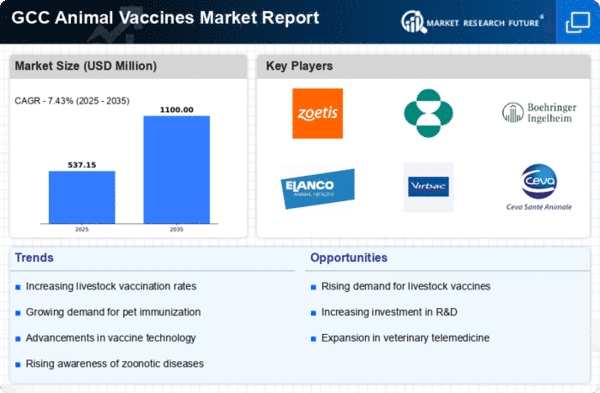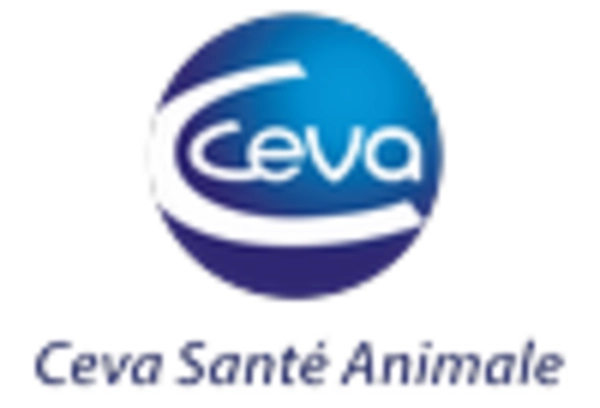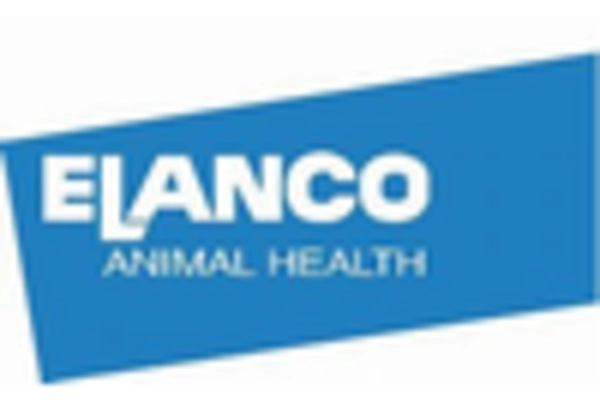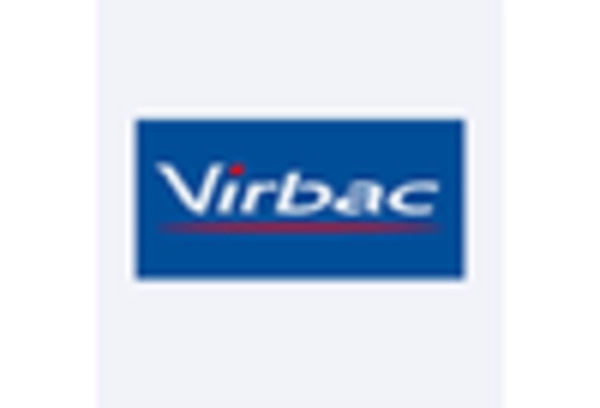Increasing Livestock Production
The demand for The demand for animal vaccines is significantly influenced by the rising need for livestock production in the GCC region. is significantly influenced by the rising need for livestock production in the GCC region. As the population grows, the need for meat, dairy, and other animal products escalates. This trend necessitates the implementation of effective vaccination programs to ensure animal health and productivity. In 2025, the livestock sector in GCC is projected to grow by approximately 4.5%, which directly correlates with the increased demand for vaccines. Vaccination not only helps in preventing diseases but also enhances the overall productivity of livestock, thereby supporting the economic stability of the region. Consequently, the animal vaccines market is likely to experience substantial growth as farmers and producers prioritize animal health to meet consumer demands.
Expansion of Veterinary Services
The expansion of veterinary services in the GCC is a significant driver for the The expansion of veterinary services in the GCC is a significant driver for the market.. As the number of veterinary clinics and professionals increases, access to vaccination services improves for both pet owners and livestock producers. In recent years, the GCC has seen a rise in veterinary clinics by approximately 15%, which correlates with a higher uptake of vaccines. This growth is likely to continue, as more individuals seek professional veterinary care for their animals. Enhanced access to veterinary services not only facilitates timely vaccinations but also promotes overall animal health awareness. Consequently, the animal vaccines market is expected to thrive as veterinary services expand and become more accessible.
Rising Awareness of Animal Health
There is a growing awareness regarding animal health and welfare among pet owners and livestock producers in the GCC. This heightened consciousness is driving the demand for preventive healthcare measures, including vaccinations. The This heightened consciousness is driving the demand for preventive healthcare measures, including vaccinations. is expected to benefit from this trend, as more stakeholders recognize the importance of immunization in preventing disease outbreaks. Surveys indicate that around 70% of pet owners in the region are now more informed about vaccination schedules and the benefits of vaccinating their animals. This shift in mindset is likely to lead to increased spending on veterinary services and vaccines, thereby propelling the growth of the animal vaccines market.
Government Initiatives and Support
Government initiatives aimed at enhancing animal health and food security are playing a crucial role in the growth of the Government initiatives aimed at enhancing animal health and food security are playing a crucial role in the growth of the market.. In the GCC, various governments are implementing policies that promote vaccination programs for both pets and livestock. For instance, funding for veterinary services and vaccination campaigns has increased, with some countries allocating up to $50 million annually for animal health initiatives. These efforts not only aim to control disease outbreaks but also to ensure the safety of food products. As a result, the animal vaccines market is likely to expand as these initiatives encourage higher vaccination rates among animals, ultimately contributing to public health and economic stability.
Technological Innovations in Vaccine Development
The The market is witnessing a surge in technological innovations that enhance vaccine efficacy and delivery methods. is witnessing a surge in technological innovations that enhance vaccine efficacy and delivery methods. Advances in biotechnology, such as recombinant vaccines and mRNA technology, are becoming increasingly prevalent in the GCC. These innovations not only improve the effectiveness of vaccines but also reduce the time required for development and production. The market is projected to grow by approximately 6% annually as these new technologies are adopted. Furthermore, the introduction of needle-free delivery systems is expected to increase vaccination rates, as they are less invasive and easier to administer. This trend indicates a promising future for the animal vaccines market as technology continues to evolve.
















